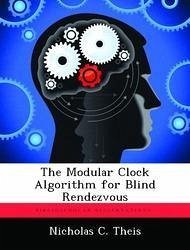Nicht lieferbar

The Modular Clock Algorithm for Blind Rendezvous
Versandkostenfrei!
Nicht lieferbar
A new algorithm, the modular clock algorithm, is developed and analyzed as a solution for the simple rendezvous environment model, coupled with a modified version for environment models with less information. This thesis examines the rendezvous problem as it exists in a Dynamic Spectrum Access cognitive network. Specifically, it addresses the problem of rendezvous in an infrastructureless environment. The thesis includes a taxonomy of commonly used environment models, and analysis of previous efforts to solve the rendezvous problem. Mathematical models and solutions used in applied statistics ...
A new algorithm, the modular clock algorithm, is developed and analyzed as a solution for the simple rendezvous environment model, coupled with a modified version for environment models with less information. This thesis examines the rendezvous problem as it exists in a Dynamic Spectrum Access cognitive network. Specifically, it addresses the problem of rendezvous in an infrastructureless environment. The thesis includes a taxonomy of commonly used environment models, and analysis of previous efforts to solve the rendezvous problem. Mathematical models and solutions used in applied statistics are analyzed for use in cognitive networking. A symmetric rendezvous pursuit-evasion game is developed and analyzed. Analysis and simulation results show that the modular clock algorithm performs better than random under a simple rendezvous environment model, while a modified version of the modular clock algorithm performs better than random in more difficult environment models. This work has been selected by scholars as being culturally important, and is part of the knowledge base of civilization as we know it. This work was reproduced from the original artifact, and remains as true to the original work as possible. Therefore, you will see the original copyright references, library stamps (as most of these works have been housed in our most important libraries around the world), and other notations in the work. This work is in the public domain in the United States of America, and possibly other nations. Within the United States, you may freely copy and distribute this work, as no entity (individual or corporate) has a copyright on the body of the work. As a reproduction of a historical artifact, this work may contain missing or blurred pages, poor pictures, errant marks, etc. Scholars believe, and we concur, that this work is important enough to be preserved, reproduced, and made generally available to the public. We appreciate your support of the preservation process, and thank you for being an important part of keeping this knowledge alive and relevant.








